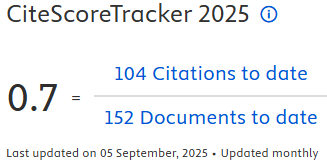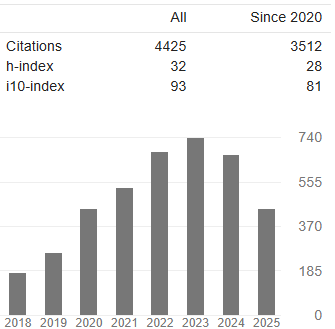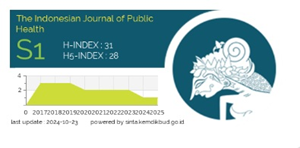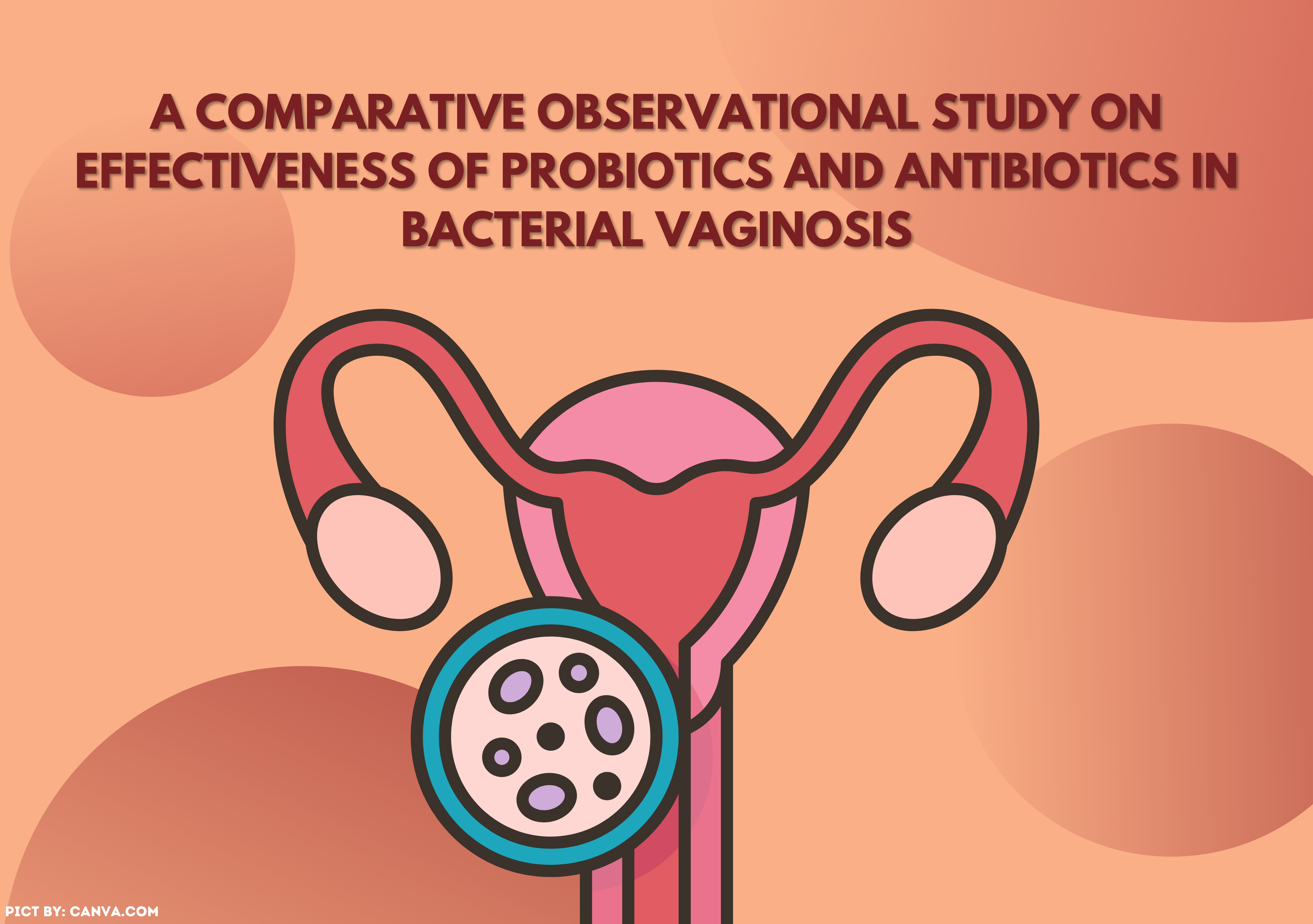ANALISIS KUALITAS BAKTERIOLOGIS AIR MINUM ISI ULANG DI KELURAHAN SEMEMI, KECAMATAN BENOWO
Downloads
The high demand for drinking water consumption leading to increase public interest to consuming refilled drinking water, because it's more practice, hygienic and affordable price. But still many Refilled Drinking Water Depots which not yet fulfilled conditions of drinking water quality which have been
specified. This aims of this researchwas to analyze the bacteriological quality of raw water and refilled drinking water in the refilled drinking water depots and the incidence of diarrhea in Sememi village, Benowo district. This research was an analytical survey by cross-sectional design. Interview conducted on 100 respondents who are use bulkdrinking water using simple random sampling. Interviews were also to handlers in refilled drinking water depot. The observation included condition and the type of disinfectant were used, and taking water sample to laboratory for examination. The independent
variables were bacteriological quality of refilled drinking water, while the incidence of diarrhea most of the dependent variable. Another variable that also studied including duration of use and period storage of refilled drinking water. For the result, all samples of raw water showed growth of E. coli, after
processing 2 depots were not eligible. The prevalence of diarrhea in consumens was 16%. It is concluded that 11 of 16 (68.75%) diarrhea patients are consume eligible drinking water refills. Supervision to depots also important to prevent and reduce the incidence diarrhea from drinking water produced.
Keywords: Refilled Drinking Water, Drinking Water Depot, diarrhea, E. coli
Asfawi S. 2004. Analisis Faktor yang Berhubungandengan Kualitas Bakteriologis Air Minum Isi Ulang pada Tingkat Produsen di Kota Semarang Tahun 2004. Skripsi. Universitas Diponegoro. Semarang.
Athena S, Hendro M, Anwar M, Haryono. 2004. Kandungan Bakteri Total Coli dan Escherechia Coli/Fecal Coli Air Minum dari Depot Air Minum Isi Ulang di Jakarta, Tanggerang, dan Bekasi. Jakarta: Balai Penelitian dan Pengembangan Kesehatan Depkes RI. Buletin Penelitian Kesehatan 32(4):136.
Cahyaningsih C, Kushadiwijaya H, Tholib A. 2009. Hubungan Higiene Sanitasi dan Perilaku Penjamah Makanan Dengan Kualitas Bakteriologis Peralatan Makan Pada Warung Makan. Jurnal Berita
Kedokteran Masyarakat, [e-journal] 25(4), Desember 2009, 180-188.
Dewanti R.A. 2017. Analisis Kualitas Bakteriologis Air Minum, Personal Hygiene dan Kejadian Diare di Kelurahan Sememi Kecamatan Benowo. Skripsi. Surabaya: Universitas Airlangga.
Dinkes Provinsi Jatim. 2014. Profi l Kesehatan Provinsi Jawa Timur Tahun 2013. Surabaya: Dinkes Prov Jatim.
Dinkes Kota Surabaya. 2014. Profi l Kesehatan Kota Surabaya Tahun 2013. Surabaya: Dinkes Kota Surabaya.
Dinkes Kota Surabaya. 2016. Profi l Kesehatan Kota Surabaya Tahun 2015. Surabaya: Dinkes Kota Surabaya.
Galus, R., Rama, P., Ramly. 2014. Gambaran Jumlah Bakteri Escherichia coli pada Air Minum Isi Ulang Sumber Depot berdasarkan Lama Penggunaan pada Penghuni Kos Smart Center Kota Gorontalo. KIM Fakultas Ilmu Kesehatan dan Keolahragaan Volume 2 Nomor 2. Universitas Negeri Gorotalo.
Kelurahan Sememi. 2016. Data Monografi Triwulan I. Sememi: Kelurahan Sememi.
Kepmenkes RI. 2010. Pedoman Pelaksanaan Penyelenggaraan Hygiene Sanitasi Depot Air Minum. Kemenkes RI. Jakarta.
Kepmenperindag No. 651 Tahun 2004 tentang Persyaratan Teknis Depot Air Minum dan Perdagangannya. Jakarta: Departemen Perindustrian dan Perdagangan RI.
Khoeriyah A, Anies, Henna R. 2013. Aspek Kualitas Bakteriologi dan Sanitasi Fisik Depot Air Minum Isi Ulang (DAMIU) di Kecamatan Cimareme Kabupaten Bandung Barat. Prosiding Seminar Nasional Pengelolaan Sumber Daya Alam dan Lingkungan. Program Magister Ilmu Lingkungan. Universitas Diponegoro.
Kotler P. 2002. Manajemen Pemasaran. Jilid 2. Jakarta: Prenhallindo.
Mukaromah, A. dan Yusrin. 2010. Pengaruh Lama Waktu Simpan Pada Suhu Ruang (27–29°C) Terhadap Kadar Zat Organik pada Air Minum Isi Ulang. Skripsi. Universitas Muhammadiyah Semarang.
Permenkes No. 43 Tahun 2014 tentang Hygiene Sanitasi Depot Air Minum. Jakarta: Kemenkes.
Permenkes No. 492 Tahun 2010 tentang Persyaratan Kualitas Air Minum. Jakarta: Menkes.
Radji, M., Heria, Herman. 2008. Pemeriksaan Bakteriologis Air minum isi ulang Isi Ulang di Beberapa Depo Air minum isi ulang Isi Ulang di Daerah Lenteng Agung dan Srengseng Sawah Jakarta Selatan. Majalah Ilmu Kefarmasian, Vol. V, No. 2, Agustus 2008, 101–109. ISSN:
–9883.
Rahayu, A. 2008. Deteksi Adanya Bakteri pada Air Minum dalam Kemasan Galon. [e-journal] 2(1).
Rahayu, C.S., Setiani, O., Nurjazuli. 2008. Deteksi Adanya Bakteri pada Air Minum dalam Kemasan Galon. [e-journal] 2(1).
Smith, P. 1995. Marketing Communication Intergrat. Approach 2nd Ed. Kogan Page, London.
Suyono, Budiman. 2010. Ilmu Kesehatan Masyarakat. Jakarta: EGC.
Wandrivel, R., Netty., Yuniar. 2012. Kualitas Air Minum yang Diproduksi Depot Air Minum Isi Ulang di Kecamatan Bungus Padang Berdasarkan Persyaratan Bakteriologis. Jurnal Kesehatan Andalas, [e-journal] 1(3).
Wulandari, A. 2007. Kualitas Bakteriologis Air minum isi ulang di Wilayah Bogor. Jurnal Kesehatan Masyarakat Nasional Oktober 2007, [e-journal] 2(2).
Wulansarie R. 2012. Sinergi Teknologi Ozon dan Sinar UV dalam Penyediaan Air Minum Isi Ulang sebagai Terobosan dalam Pencegahan Penyakit Infeksi Diare di Indonesia. Skripsi. Universitas Indonesia.
- The authors agree to transfer the transfer copyright of the article to The Indonesian Journal of Public Health effective if and when the paper is accepted for publication.
- Authors and other parties are bound to the Creative Commons Attribution-NonCommercial-ShareAlike 4.0 International License for the published articles, legal formal aspect of journal publication accessibility refers to Creative Commons Attribution-NonCommercial-ShareAlike 4.0 International License (CC BY-NC-SA), implies that:
- Attribution ” You must give appropriate credit, provide a link to the license, and indicate if changes were made. You may do so in any reasonable manner, but not in any way that suggests the licensor endorses you or your use.
- NonCommercial ” You may not use the material for commercial purposes.
- ShareAlike ” If you remix, transform, or build upon the material, you must distribute your contributions under the same license as the original.































